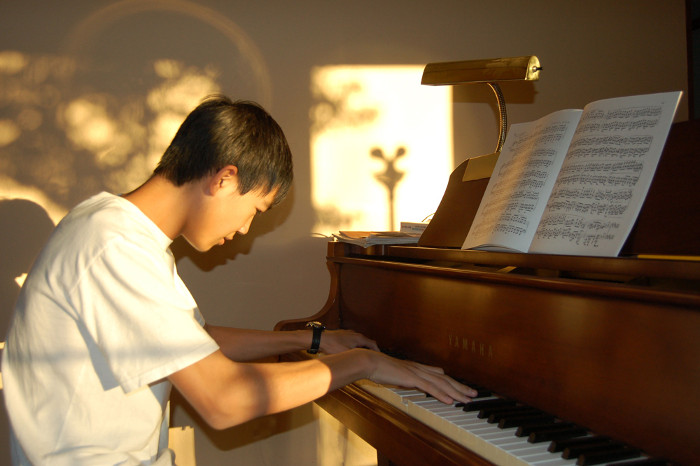Super-fast recipes for new skills have been revealed by science
According to a recent study by experts at Johns Hopkins University, people can learn new skills twice as fast by making subtle adjustments in their practice habits.
In other words, to gain experience from learning motor skills you need to build "muscle memory" to be able to perform activities such as playing musical instruments or a sport. Quick and effective way. And the way you usually do this is through constant repetition - beating up hundreds of tennis balls or playing cards until your fingers turn on blood .

Experts at Hopkins argue that continuous practice of skills is necessary but not enough.(Photo: ellesmusicstudio).
This is not wrong, but the Hopkins study suggests that it is incomplete. Instead of constantly repeating one thing, you can learn everything even twice as fast if you change your habits.
For example, do you want to practice a baseball break? Please change the size and weight of the club. Are you trying to loop the 12-bar blues chord on the La string? Spend 20 minutes playing blues on Mi strings. Practice backhand with tennis rackets of different sizes and weights.
"We realize that if you practice to accomplish your goals, but in a slightly modified way, you will actually learn more and faster than if you just keep practicing constantly. right way " - Pablo Celnik - author of this study said.
The study was conducted with 86 healthy volunteers and those who were asked to learn how to perform an abstract mechanical task were to move the cursor on the screen by pushing an object connected to the machine. count.
"The test screen has 5 windows and a" master key. "Participants are required to move the cursor from the master key to different windows according to the model set up most quickly and accurately. "- study description.

Basically, participants must learn to use the mouse because it is operated by grasping, not sliding around.(Photo: qykapp)
The objects are divided into 3 groups. These groups all attended an initial test session. Then the two groups continued to practice for the next 6 hours. The first group redo correctly the previous test. The second group also practiced for 6 hours but with a different test. While the rules are the same - move the cursor around by grasping the attachment - but the researchers adjusted the test by changing the amount of force needed to use the cursor. Meanwhile, the third group plays a controlling role.
In the end, all three groups repeated the initial test again, the first 24 hours. The question is: which group performs best and shows the ability to move the cursor the most advanced?
The control group - those who did not participate in the next 6 hour training course - gave the worst performance results. The group that consistently performed an accurate experiment over the next 6 hours did significantly better.

To improve skills we need to update the current memory information.(Photo: Ussportcamp).
However, the 6-hour shift test group was the best performers - after 24 hours from the initial test, the group scored nearly double the score compared to the performance group. repeated testing for 6 hours.
"To improve skills we need to update the current memory information," the scientists concluded. If you simply always do exactly the same thing in the same way, you won't gain much new knowledge than what you already know.
However, experts also warn that it's important not to make things change too big. For example, in golf, if you want to improve your swing and spend 20 minutes a day hitting the round, chances are you will not achieve your desired goal. "If you do things that are very different, you won't get the results. Adjustments between exercises need to be done subtly," Celnik said.
- 10 skills 'wish' we are taught at school
- Admire the supernatural skills of people
- Decoding super-fast stars in 'Ngan river'
- What you don't know about BRT super fast bus systems around the world
- AI can help you find recipes just from a photo
- Scientifically proven: This is a way for you to learn anything as fast as lightning
- The mystery of a quick gust at the supermassive black holes
- Portable speaker fully charged battery after only 5 minutes
- Detecting super-fast star systems disrupts conventional physics theory
- 10 mysteries in the universe
- Survival tips: How to cut the rope when there is no cutlery
- Super-fast star detection
 Green tea cleans teeth better than mouthwash?
Green tea cleans teeth better than mouthwash? Death kiss: This is why you should not let anyone kiss your baby's lips
Death kiss: This is why you should not let anyone kiss your baby's lips What is salmonellosis?
What is salmonellosis? Caution should be exercised when using aloe vera through eating and drinking
Caution should be exercised when using aloe vera through eating and drinking Belgian university student invents kit to test for narcotics in drinks
Belgian university student invents kit to test for narcotics in drinks  Students make dish shaping machine from areca spathe
Students make dish shaping machine from areca spathe  Half a Billion Year Old Monster Appears Intact, Beautiful as a Bas-Sculpture in China
Half a Billion Year Old Monster Appears Intact, Beautiful as a Bas-Sculpture in China  Octopuses cooperate with fish to hunt
Octopuses cooperate with fish to hunt  Strange creature 30m long: Thought it was a dinosaur, turns out it's something more monstrous!
Strange creature 30m long: Thought it was a dinosaur, turns out it's something more monstrous!  The angry Minion-like anusless creature is not the earliest ancestor of mankind
The angry Minion-like anusless creature is not the earliest ancestor of mankind 